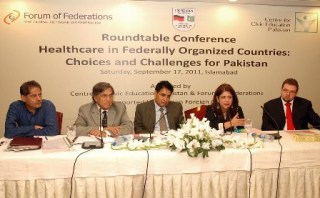September 17. Islamabad. Speakers at the roundtable conference on ‘Healthcare in Federally Organized Countries’ linked the poor quality of healthcare services to the political instability and pressed the provincial health departments to cease the opportunity provided by the 18th amendment which has made both policy and implementation the provincial prerogative.
Organized by the Centre for Civic Education, Pakistan and Forum of Federations with support from German Foreign Office the conference provided platform to the health officials of all the four provinces for sharing the opportunities and challenges they face in the wake of devolution of health to the provinces.
Dr. Mushtaq Khan Jadoon, a public health policy expert, emphasized that the health related matters could not be limited to the health department alone. “If we do not invest in clean environment we will not be able to achieve much from investment in health.” Dr. Jadoon pointed out some of the challenges that the federal and provincial governments needed to meet. “The subjects of drugs and medicines, poisonous and dangerous drugs, move to the provinces. The provinces are now responsible to control the spread of communicable diseases.” To meet these challenges governments need to get closer to the people and ensure their participation and collaboration so as to develop a sense of ownership among them, he said.
Dr. Muhammad Nizamuddin, vice chancellor University of Gujrat, pointed out structural, political and attitudinal problems which could create difficulty in the devolution process. He said that after the devolution from federal to the provincial levels it was now the duty of the provinces to empower, facilitate the district governments in taking up their responsibilities and complete the process of devolution.
Dr Saba Gul Khattak underlined the need to view the capacity of state to deliver from the political economy perspective. She said that for more relevant and effective policy decisions consultation with the people was imperative which could also help in saving the energy and resources. Zafarullah Khan, executive director Centre for Civic Education, said that the money spent on the health sector should not be taken as expenditure but as investment for better human resources.
Dr. Noorul Iman, special secretary health Khyber-Pakhtunkhwa, Shah Irfan additional secretary health Balochistan, Dr. Syed Talat Iqbal, health department Punjab and Dr. Abdul Rashid Shaikh, Public Health Department Sindh presented case studies about reorganization of health departments of their respective provinces. During these presentations some of the common issues brought forth include; capacity building of provincial governments, new organizational structures and corresponding changes in the rules of business, avenues of participation and collaboration, changing mindsets, to understand about possible mechanisms to evolve benchmarks for quality of services.

